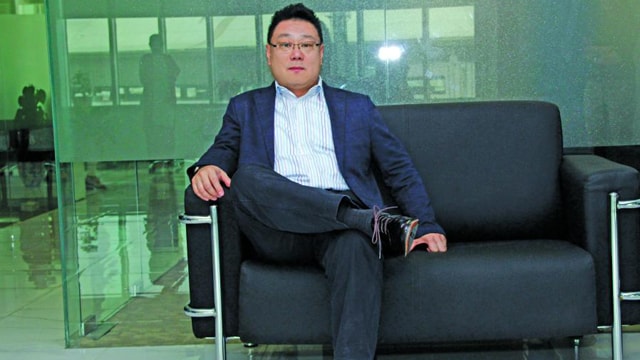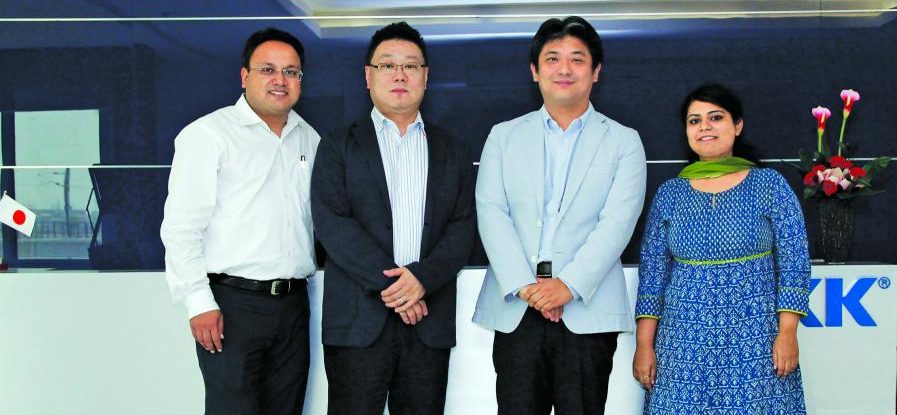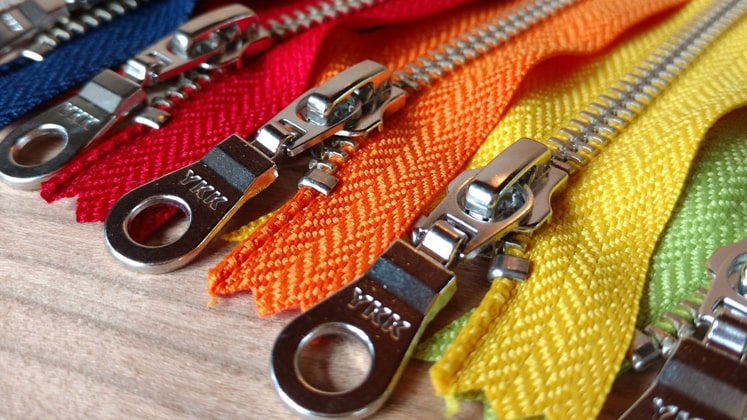Zipper… sometimes an obscure but certainly an important garment accessory, if gone wrong, can render an entire garment unwearable, thereby requiring consistent and reliable quality. Earning the confidence of many reputed fashion brands for decades YKK, the Japanese zipper giant, is manufacturing roughly half of the zippers used worldwide through 71 locations around the globe. Producing 7.2 billion zippers in a year, manufactured to rigorous quality-control standards within a vertically integrated production system, YKK’s products have earned the reputation of a global market leader. In an exclusive conversation with Apparel Online , Noboru Matsumoto, MD, YKK India Pvt. Ltd., talks about the strategic changes within the Indian operations over the past two years since he took charge, and which have resulted in an upward growth for the company.
Though supplying to India for ages, YKK entered the country in 1995 with a vision of making everything locally to feed the market, which was fast developing into a major garment exporting hub with the incorporation of YKK India Private Limited, a wholly-owned subsidiary for the manufacture of metallic and non-metallic zippers. With global benchmarks on product standardisation and focusing on consistent quality, the Rewari plant in Haryana was inaugurated two years later. “It does not matter from where one buys the final product – from India, Bangladesh, Pakistan, or anywhere else – the fact is that consistency and uniformity in quality is what YKK focuses on.” claims Matsumoto confidently.

In fact the wide location base and consistency in quality over these manufacturing bases, is one of the major reasons that YKK enjoys a number of nominations in their portfolio. Yet, having a nomination does not mean ‘secure business’ as retailers are now nominating more companies for their brands, thereby creating competition among top contenders on global parameters. “Whether we are working as nominated supplier or competing in open market, consistent quality is paramount, and today YKK’s quality is acknowledged by everyone, even by our competitors. It is because manufacturers have confi dence in YKK that they buy from us, and not just because we are nominated,” asserts Matsumoto.
Besides global consistent quality, another thing that keeps YKK ahead is the focus on innovation and passion to provide something new to retain customers’ loyalty. “We are investing a lot to make a sustainable product for the future, and since we are committed to each location that we work in, we also have R&D department in India, especially assigned for the local needs,” shares Matsumoto. Every year the company displays its innovations at various exhibitions, focusing on a new category every year – from performance enhancement to sustainability to aesthetics, the themes are many. They also forecast the next season’s demand through deep study of market and fashion trends.

After conquering the export market, the company is now directly targeting the Indian domestic market, catching and cashing in on the pulse of domestic brands such as Pantaloons and Big Bazaar, as the market opens up to new ideas, shunning its conservative image. Currently, the company has two kinds of business operations in the domestic market – direct sales to local brands and channel sales, which is a volume business. “Today, our share is recognized even in the unorganized market and we have certain products which are very well accepted in the market. These products are manufactured just for India and are typical of the local market,” reiterates Matsumoto. Catering to the local needs of the market, the company is growing at a rate of 35 per cent in the domestic market, through quick response and investment.
After conquering the export market, the company is now directly targeting the Indian domestic market, catching and cashing in on the pulse of domestic brands such as Pantaloons and Big Bazaar, as the market opens up to new ideas, shunning its conservative image.
Motivating the company to venture into the domestic market is the maturing market, propelled by a growing number of youth (next generation) taking over and putting new ideas and thoughts into the business, leading to strategic changes. “We could see the change happening and the only way to understand and gain from the change was to be in direct contact with the customers. If we don’t know how the customer thinks and what his sensibilities are, how can we as an organization grow?” wonders Matsumoto. In the past two years, the company has increasingly gone out to meet its customers, taken their opinion on products and gauged their service needs, which has resulted in enhanced customer loyalty, brand building and product innovation.
During these two years, another change that Matsumoto along with Tatsumi Kojima, General Manager, YKK India have focused on is better synergy with dealers whose vision and targets matches with that of the company, and together we adapt to the changes in the market trends. We aim to work towards a common goal. Having moved directly into the market in many segments, YKK is now investing on skilled manpower and the response has been encouraging. It is due to this upfront approach that the company has been successful in the highly fragmented channel business for the tailor segment, catering to two sub-segments; mid-high and low-priced sensitive markets. “YKK can now be found in Sadar Bazaar, but even these low-cost products are made with the same parameters of compliance and quality, there is no compromise,” reveals Matsumoto. Though YKK are world leaders, with benchmark practices followed by many zipper manufacturers around the world, still they face challenges… In a country like India, one of the biggest is the people’s mindset, which has continuously been transformed in the last two years. “However big the company, if they cannot deliver to the expectations of their customers, they will not survive, so it is important to educate customers on why we are better or more expensive,” reasons Matsumoto.
Today, the company’s reputation is such that competitors have built their product standards with an eye on YKK, some are even following the same shade card of the company. Being consumerfriendly, the company has opened their factories to fashion institutes, buyers, and designers to enhance their education.
Counterfeit zippers also remain one of the challenges faced by YKK, which the company is resolving through hiring of legal agents, who conduct timely raids on whereabouts. “We have seen the counterfeit business reducing substantially over the last two years. I think people are getting educated and understand what zipper quality really means, and not getting influenced by logos,” reiterates Mohit Verma, Manager, Sales and Marketing, who is working on ‘ground zero’. In addition, colour matching of the zipper tapes is critical for any company and one of the major issues in fashion. For this the company is using electronic (E) matching for colour recipes at all locations; so if the E-values match, then the colour is accepted with variations within tolerant levels. “It’s about getting more and more technology in the production process and YKK is the master in technology, wherein there are still opportunities for improvement!” states Mohit.
To ensure that all quality and production demands for different market segments are fulfilled, the company heavily relies on new technology and automation for manufacturing, so investing in technology is a good option, the company believes that more automation leads to more effi ciency and productivity,” adds Matsumoto. Seeing the good response coming from the domestic segment the company is now looking to open three more factories, one each in Delhi-NCR, Bangalore and Chennai to feed the local demands of these three distinct markets. “We need to provide more good-quality zippers to India and spend more on CSR for the community, such as education in villages, medical facilities, computer education for girls, sewing skills, crèche, etc.” shares Matsumoto.
Today, the company’s reputation is such that competitors have built their product standards with an eye on YKK, some are even following the same shade card of the company. Being consumer-friendly, the company has opened their factories to fashion institutes, buyers, and designers to enhance their education. Apart from buyer audits, the company organizes seminars to technically educate its staff and has also created an instruction manual for its customers, besides maintaining an interactive website. “We say that YKK is a quality maker, so in order to adhere to it we have stringent norms. We will not launch a new product before proper R&D and verification, and also the final approval from our headquarters in Japan. We will conduct a trial run and test it on numerous parameters, before it is launched in the market, otherwise not,” proclaims Mohit.
Generating a business of around US $ 100 million in India from the export and domestic market, the company focuses on its people while giving prime importance to local opinion and suggestions. “We are Japanese and have brought a certain culture to the organization, but I try to take the opinion of the local people also, as they are the once who go to the market, get the feedback and interpret the customer’s demand. There are more than 1,000 people working in our factory, if those 1,000 people go in different ways then how do we control? Therefore, it is important to march in the same direction,” declares Matsumoto, who joined the YKK group in 1997, moving from Hong Kong, to China, to Taiwan and now finally heading India’s operations in 2013.
The company is seeing tremendous positive changes under the leadership of Matsumoto, who believes in taking quick decisions and high responsiveness. One such change that has brought in optimism and motivation is delegation of greater responsibility to people. “He has given greater responsibility to individuals and also freedom to take action. Earlier there were just 6 locations in India, and within 2 years we have expanded to 12 branches, while 1 branch office is in Nepal which brings us closer to our customers,” affirms Mohit. With a 20 per cent growth path year-on-year, YKK India under the dynamic leadership of Matsumoto is like one big family working towards one goal of providing the best quality products to a growing Indian customer base.







